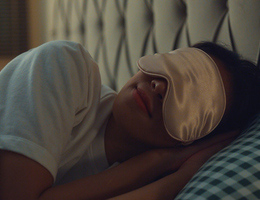
March 11, 2024—Even if you get to bed on time, you might be missing out on the full benefits of great sleep. That’s because if the glow of a TV or smartphone seeps into dreamland, it might affect your health.
A new study published in the journal Sleep investigated the negative impact of light at night on older adults. Researchers looked at the disease risk and overnight light exposure for 552 study participants ages 63 to 84.
Light conditions in their bedrooms were measured and categorized as high light at night, low light at night or no light at night. The study found that any nighttime light exposure was associated with an increased risk of obesity, diabetes and hypertension.
This isn't the first time that exposure to light during sleep has been associated with negative health outcomes. Past research has shown:
- Women who sleep with a light or TV on in the bedroom were 17% more likely to gain weight.
- Adults in their 20s who experienced light exposure at night increased their risk of insulin resistance, a major risk factor for diabetes.
- Light exposure at night may play a role in depression and anxiety.
Tips for reducing light
Researchers think that even streetlights coming in through a window or a bathroom light down the hall can be a problem. Devices like phones and tablets are especially bad for sleep because they give off blue light that mimics daylight. This blue light has also been linked to increased cardiovascular disease risk and obesity.
Here's how to cut down on light so you can cut your disease risk:
- Install motion sensor lights to prevent falls during those middle-of-the-night visits to the bathroom.
- Turn off all the lights around the house, not just in your bedroom.
- Seal in the darkness by placing a rolled-up towel along the gap between your bedroom door and the floor.
- Power down your electronics—that means computers, tablets and smartphones—before bedtime.
- Use a blue-light filter if you really can't turn off the screens.
- Cover your windows with curtains or blinds that block light coming in from outside.
- Wear an eye mask. This can help when you can't control the light in your environment.
Find out more about the role sleep plays in your health and how to get better shut-eye.
Sources
- National Heart, Lung, and Blood Institute. "Turn Off All the Lights at Night: Your Heart Will Thank You." https://www.nhlbi.nih.gov/news/2022/turn-off-lights-at-night-your-heart-will-thank-you.
- National Institutes of Health. "Sleeping With Artificial Light at Night Associated With Weight Gain in Women." https://www.nih.gov/news-events/news-releases/sleeping-artificial-light-night-associated-weight-gain-women.
- Oxford Academic. "Light at Night in Older Age Is Associated With Obesity, Diabetes, and Hypertension." https://academic.oup.com/sleep/article/46/3/zsac130/6608953.
- Sleep Foundation. "How to Make Your Room Dark." https://www.sleepfoundation.org/bedroom-environment/making-your-room-dark.
- Sleep Foundation. "Light and Sleep." https://www.sleepfoundation.org/bedroom-environment/light-and-sleep.